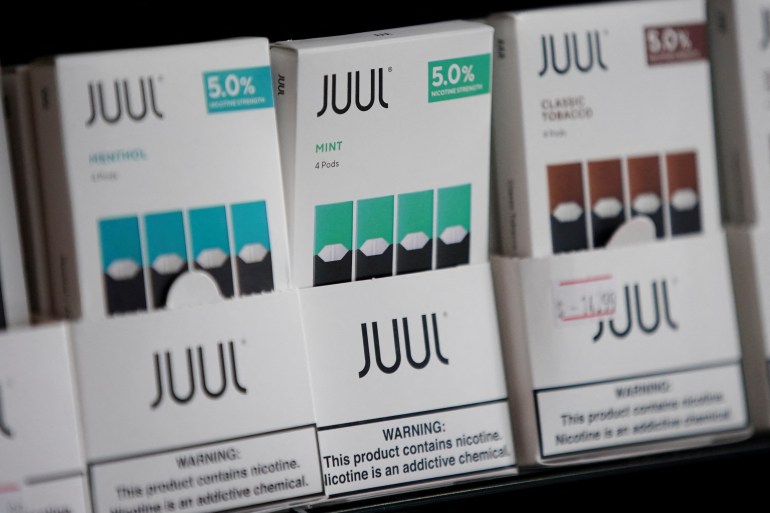Juul to pay $439m to settle US e-cigarette marketing probe
E-cigarette maker also pledges to refrain from some marketing, such as the use of cartoons and depictions of users under age 35.

E-cigarette maker Juul Labs Inc has agreed to pay $438.5m to settle claims by 34 US states and territories that it downplayed its products’ risks and targeted underage buyers, several states said.
As part of the settlement announced on Tuesday, Juul has agreed to refrain from some types of marketing, including the use of cartoons, product placement and depictions of users under 35.
Keep reading
list of 4 itemsJuul appeals to US federal court to end ban on e-cigarettes
US federal health agency bans Juul e-cigarettes
Juul to pay $22.5m to settle Washington vaping suit
The deal also includes restrictions on where Juul products may be placed in stores, age verification on all sales, and limits to online and retail sales.
The payout stems from a two-year investigation led by Connecticut, Texas and Oregon. The $438.5m will be paid out over a period of six to 10 years.
Connecticut Attorney General William Tong said Connecticut’s payment of at least $16m will go towards vaping prevention and education efforts.
“I’m under no illusions and cannot claim that it will stop youth vaping,” Tong said. “It continues to be an epidemic. It continues to be a huge problem. But we have essentially taken a big chunk out of what was once a market leader, and by their conduct, a major offender.”
The settlement amounts to about 25 percent of Juul’s sales in the United States, which totalled $1.9bn last year.
Tong said it was an “agreement in principle”, meaning the states will be finalising the settlement documents over the next several weeks.
Juul, which has not admitted wrongdoing, called the settlement “a significant part of our ongoing commitment to resolve issues from the past” and said that the marketing restrictions were consistent with its practices since it undertook a “company-wide reset” in 2019.
The company at that time pulled most flavours from the market and halted much of its advertising under pressure from regulators.
“We remain focused on our future as we fulfill our mission to transition adult smokers away from cigarettes — the number one cause of preventable death — while combating underage use,” Juul said in a statement.
Juul previously settled similar claims by Arizona, North Carolina, Louisiana and Washington. Some states, including New York, California, Massachusetts and Illinois, are continuing to pursue claims against the company.

Teen use of e-cigarettes skyrocketed in the years following Juul’s 2015 launch, leading the US Food and Drug Administration (FDA) to declare an “epidemic” of underage vaping. Health experts said the unprecedented increase risked hooking a generation of young people on nicotine.
But since 2019, Juul has mostly been in retreat, dropping all US advertising and pulling its fruit and candy flavours from store shelves. Juul initially sold its high-nicotine pods in flavours like mango, mint and creme.
The products became a scourge in US high schools, with students vaping in bathrooms and in the hallways between classes.
Thousands of local governments and individuals also have brought lawsuits against the company, most of which have been consolidated in federal court in San Francisco, California.
The first trial is set for November in a case brought by San Francisco’s school district. The next trial, scheduled for January, will be in a case brought by the family of a Tennessee teenager who allegedly became addicted to Juul’s e-cigarettes.
The FDA in June briefly banned the products, though it put the ban on hold and agreed to reconsider after the company appealed.